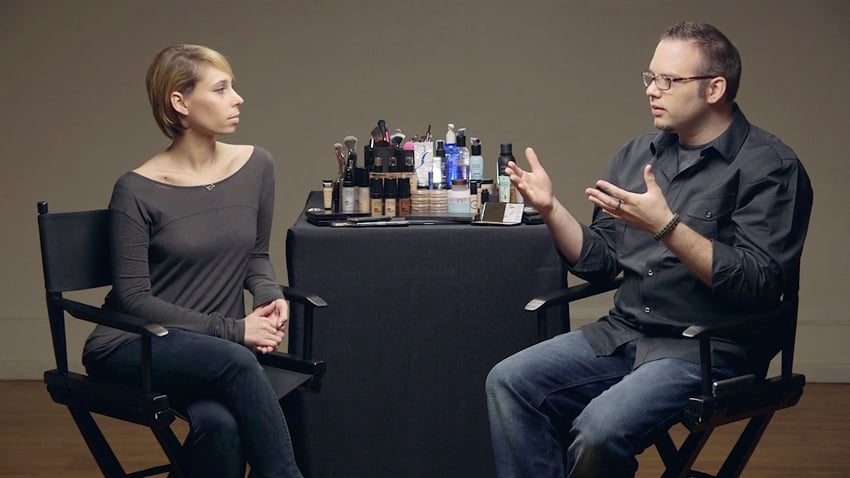Hiring a professional makeup artist for the first time can be a little intimidating, but having a pro on your shoot can make a big difference to how your photos turn out.
In this photography makeup tutorial, you will learn about the benefits of using a makeup artist, how to communicate with them and your clients, and what to look for in a makeup artist.
Benefits of a Professional Makeup Artist
Aside from having previous education and experience, professional makeup artists will also be able to understand how other factors that you might not think about will affect makeup. Also, they are going to know what products to use and where and when to use them.
Another big factor is that when you bring a makeup artist to your shoot, it reduces the stress level for you and your subjects. A makeup artist will know how to communicate with people about how they look, and will be able to explain what they’re doing in a way that makes people feel comfortable.
Makeup artists are trained to be able to see different facial features and anticipate what the camera is going to need to see. They’re also known to make sure that they use delicate terminology so that clients don’t feel personally attacked by what the artist might be doing to their face.
The last thing you want your subject to be is self-conscious, and you want to build up that confidence, so having a makeup artist who knows how to enhance their facial structure and their features and make them feel good about themselves is very important. When you have someone who helps to give your subjects that extra bit of confidence, it can make a big impact on the photos or videos you’re making.



What to Look for in a Makeup Artist
It’s good to be able to see some previous work from makeup artists. That way, you can at least gauge what kind of work they’d be producing for you. Also, if they have a wide variety of different looks and different types of makeup in their portfolio, that’s always a good indication that they are experienced or at least that they understand how to produce different work and not always the same look on different faces.
Just like with a photographer, checking out their portfolio is going to be really important. You want to make sure that they’re able to create the right look for the project that you are working on, or at least that they have a good variety of skills at their disposal. That way, they’ll be able to work with you creatively to come up with some new and interesting looks that fit your particular project.
Also, it’s helpful to keep communication open with makeup artists and describe exactly what you need. Makeup artists have their own ideas of what they’d like to create or what you might want them to create. Try to use as much descriptive terminology as you can to help the makeup artist paint a picture in their mind of what you want. And that makeup artist should be communicating with you as well.
If you’re not getting a whole lot of information from them and you’re pulling teeth to try to see what they’re thinking of for your project, then that might not be the best match. You definitely want the communication to be a two-way street.
How to Find a Makeup Artist
There are a ton of different places where you can look for makeup artists. Some salons have freelance makeup artists, so if you were interested in doing a photo shoot or a video, you could always inquire about hiring them as a freelance.
There are also modelling agencies that have their own collections of artists, so you could reach out to them and see if they would be able to help you out with your shoot.
Of course, online is a great way that you can shop through and filter down any specific needs, be it location, types of makeup, artistry—anything you really need.
Coming up in our next photography makeup tutorial, we’re going to walk through some basic products and basic tools that you’ll want to have in your kit if you want to be able to do some basic fixes and a little bit of touching up on your shoots.
